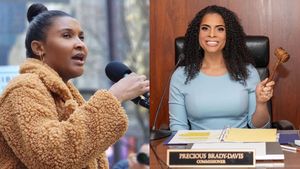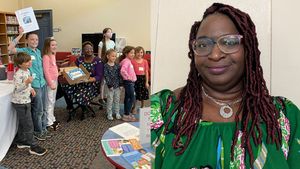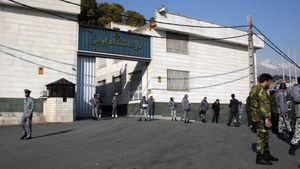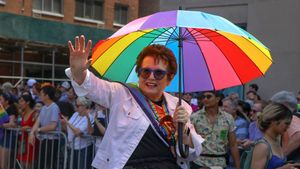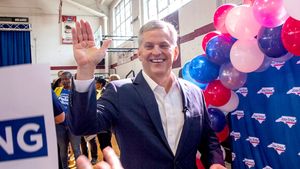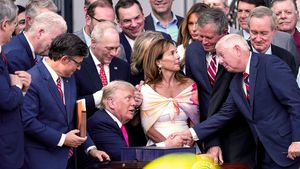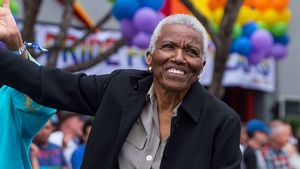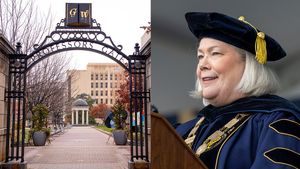All Rights reserved
By continuing to use our site, you agree to our Privacy Policy and Terms of Use.
15 Black Gay & Queer Men From History You Should Know
Black gay men have always made history.

The history of America would not exist without Black gay men. They've served as civil rights leaders, revolutionary artists, labor organizers, scientists, politicians, and educators, and their impact has touched every part of this country.
But still, many Black gay men are forgotten, and erased from history, with their accomplishments being washed away. But American history is Black history, and is Black gay history. So we've put together this list of just some of the important Black gay men who have changed America and the World.
Bayard Rustin

Bayard Rustin was one of America's greatest civil rights leaders. He fought for civil rights for Black Americans, as well as labor rights and gay rights in the '80s. In the '50s and '60s, Rustin organized Freedom Rides, bus boycotts, and marches alongside other civil rights leaders. It was Rustin who taught Martin Luther King Jr. about nonviolent resistance. He was one of the organizers for the March of Washington for Jobs and Freedom, and without his influence and leadership, much of the American civil rights movement never would've happened.
James Baldwin

Baldwin is one of America's greatest writers, as well as a powerful activist in the civil rights and gay rights movements. When he released his second novel, Giovanni's Room, in 1956, its themes of gay social and self-acceptance in Black communities were something never talked about in such a public way. His writing on Black gay and bisexual men has paved the way for queer writers of all types, and his mark on culture will never be forgotten.
He and Rustin were two of the only out gay men prominently involved in the American civil rights movement. His books like Go Tell it On the Mountain, Notes of a Native Son, and If Beale Streat Could Talk are considered classics of American writing.
Alvin Ailey

Alvin Ailey was an American dancer, director, choreographer, and activist who changed American dance forever. He founded the Alvin Ailey American Dance Theater where he nurtured Black artists and fused theater, modern dance, ballet, and jazz to create works like Revelations, which is recognized as one of the most popular and widely performed ballets in the world.
Willi Ninja

Known as "the godfather of voguing," Willi Ninja was a dancer and choreographer who appeared in the documentary Paris Is Burning. With the House of Ninja, which he started in 1982, Ninja was one of the leaders of the vogue dance movement that became popular after the documentary.
Augustus Granville Dill

Granville Dill was a student of W.E.B. Du Bois and served as the business manager of The Crisis, a magazine written by Black writers during the Harlem Renaissance. He was a member of the NAACP and made major contributions to race relations in labor. He was arrested for "homosexual activities" in 1928 and was stripped of his position at The Crisis.
Paris Dupree

The founding member and mother of the House of Dupree, Paris Dupree is said to be one of the originators of voguing. According to legend, Dupree was at a nightclub called Footsteps when some gay Black men started throwing shade at each other. Dupree started dancing, pulling a copy of Vogue magazine out of his bag, and stopped, posing to the beat while imitating the models' poses.
In 1981, the House of Dupree hosted a ball that introduced the concept of categories to the ballroom scene. Today's voguing competitions and balls are still influenced by Dupree.
*Editor's Note: As with many LGBTQ+ elders, it can be difficult to be definitive about someone's identity prior to the 1990s. Some, today, consider Dupree to be a trans woman. Within the ballroom community, Dupree walked as a "butch queen in drags" which was generally understood to be a gay man wearing feminine garments -- some might term this nonbinary or gender nonconforming today. Dupree used pronouns interchangeably. As there was very little writing from the community's perspective at the time, it is unknown what Dupree would have self-identified as given the chance. As a result, we have decided to go with the general understanding of Dupree's ballroom category for the purposes of this story.
William Dorsey Swann

William Dorsey Swann was the original "queen of drag." He was born into slavery, but after the Civil War he got a job as a hotel waiter. In the 1880s and 1890s, Swan started to organize a series of balls in Washington, D.C. where he declared himself the "queen of drag." At these secret balls, other formerly enslaved men would dress up in dresses and have a chance to be their true selves.
Swan was arrested multiple times, including the first documented case of arrest for female impersonation in the United States in 1888. In 1896, he was falsely imprisoned for running a brothel and requested a pardon from President Grover Cleveland. While his request was denied, Swann became the first American on record to pursue legal or political action to defend the LGBTQ+ community's right to gather.
Ellis Haizlip

Haizlip was the creator and executive producer of the TV show Soul!, an arts program that was one of the first shows on TV to showcase Black artists and musicians like Nikki Giovanni, Roberta Flack, and Ashford and Simpson. He also produced plays starring actors like Cicely Tyson and James Earl Jones, and performances by Alvin Ailey's dance company.
Langston Hughes

One of the leaders of the Harlem Renaissance and one of America's greatest poets, Langston Hughes was first published in The Crisis magazine. His poems, plays, and writings on Black life in America changed the way the world looked at African Americans. He was also a civil rights leader, writing a weekly column in the Black newspaper The Chicago Defender. His poems are still taught in schools across the country today.
Alain Locke

Alain LeRoy Locke was the first African American Rhodes Scholar, as well as a writer, philosopher, and educator who became known as the "Dean" of the Harlem Renaissance. He wrote and put together the book The New Negro, considered one of the landmarks in Black literature. He's considered one of the great Black philosophers in American history.
Richard Bruce Nugent

While the Harlem Renaissance was filled with Black gay writers, Nugent was one of the few who was publicly out at the time. His outspoken depictions of homosexuality sometimes caused him to fall out of favor with other, more discreet contemporaries, but his writing and art, including the short story "Smoke, Lilies, and Jade," on interracial male desire, have stood the test of time.
Wallace Thurman

Another member of the Harlem Renaissance, Thurman's best known novel is The Blacker the Berry: A Novel of Negro Life, which explores colorism in the Black community. His flat in a rooming house during the Harlem Renaissance was used as a meeting room for many young and avant-garde Black artists and writers at the time, including Langston Hughes, Zora Neale Hurston, and Richard Bruce Nugent.
John T. Graves of the Society For Human Rights

Graves was a Black clergyman who served as the first president and co-director of the Society for Human Rights (the former headquarters of which are pictured), the first recognized gay rights organization in the United States. Founded by German immigrant Henry Gerber and influenced by German doctor Magnus Hirschfeld, the Society for Human Rights was formed in Illinois in 1924. The group released a newsletter and hoped to educate the world on the negative treatment of homosexuals at the time. The group only had seven members at it's founding, and just a year after its founding, it was shut down after the police arrested Graves, Gerber, and other members on false charges that they performed homosexual acts in front of one member's children.
Glenn Burke

Glenn Burke wasn't only the first Major League Player to come out as gay during his career and publicly acknowledge his sexuality, he also invented the high five in 1977. That year, he ran onto the field to congratulate his teammate Dusty Baker on hitting his 30th home run, when he raised his hand over his head and Baker slapped it. Burke was among the first class of inductees into the National Gay and Lesbian Sports Hall of Fame.
Phill Wilson

Phill Wilson and his partner were diagnosed with HIV in the early '80s and soon became one of the leading HIV/AIDS activists in the country. He has worked for the AIDS Project in Los Angeles, served as the co-chair of the Los Angeles HIV Health Commission, and was appointed to President Barack Obama's Advisory Council on HIV/AIDS. In 1999 he founded the Black AIDS Institute.
Latest Stories
'Drag Race': Snatch Game winners and the celebs they impersonated
23 pics of Taylor Zakhar Perez being a hottie at fashion shows & beyond
53 steamy celebrity Calvin Klein ads the gays won't forget
These shows introduced our favorite gay TV dads of all time
Oh Pit Crew! 31 pics of 'Drag Race's hottest members worldwide
Proud parents: Celebs who love and support their LGBTQ+ kids
29 of the dozens of lesbian cops in TV & movies
Porkchop Queens: All first-eliminated queens from 'RuPaul's Drag Race'
12 queer storylines edited out or scrapped in major movies
45 pics of Nicholas Galitzine to get you excited for He-Man
10 of the sexiest gay romantic films you can watch right now
27 celebrities who proudly identify as lesbians
15 historic icons who tragically died in the closet
Ranking the highest-earning queens in 'RuPaul's Drag Race' herstory
41 pics of 'Foundation' star Lee Pace that exude Big Daddy Energy
Ranking the 15 best lesbian and sapphic coming-of-age movies ever
Glitter, glam, & good times: 'Drag Me to the Catskills' returns
16 queens who quit or retired from drag after 'RuPaul's Drag Race'
New 'Boys! Boys! Boys!' podcast explores queer art and identity
Trending stories
Recommended Stories for You

Mey Rude
Mey Rude is a journalist and cultural critic who has been covering queer news for a decade. The transgender, Latina lesbian lives in Los Angeles with her fiancée.
Mey Rude is a journalist and cultural critic who has been covering queer news for a decade. The transgender, Latina lesbian lives in Los Angeles with her fiancée.























